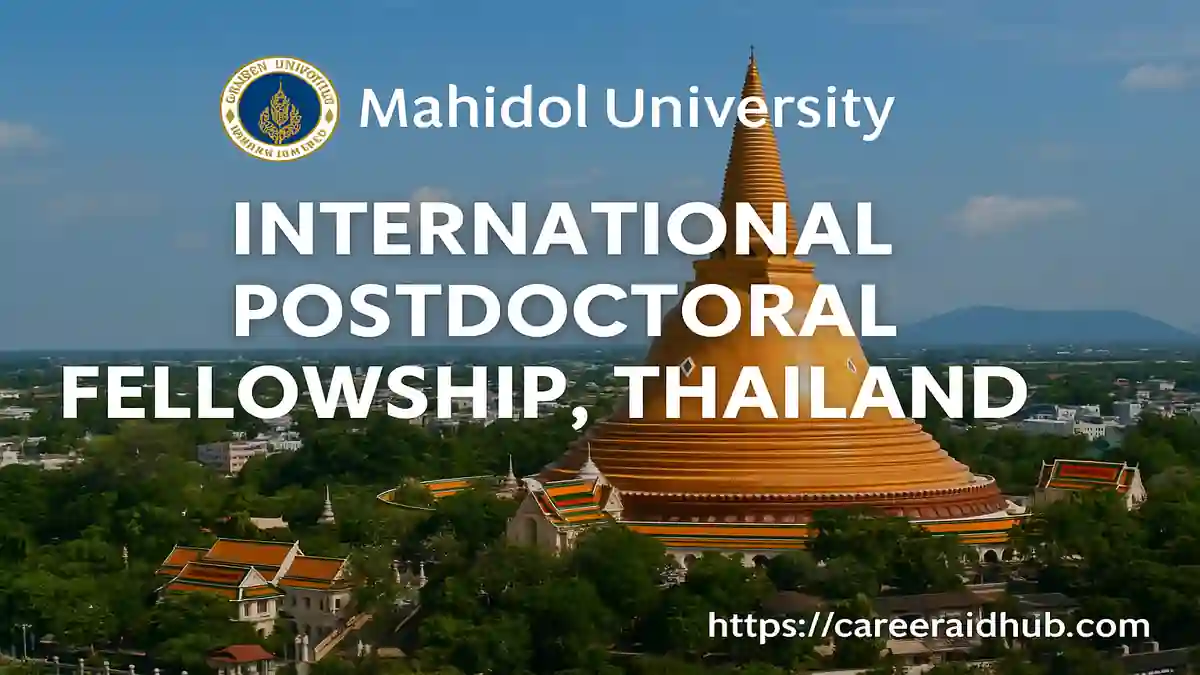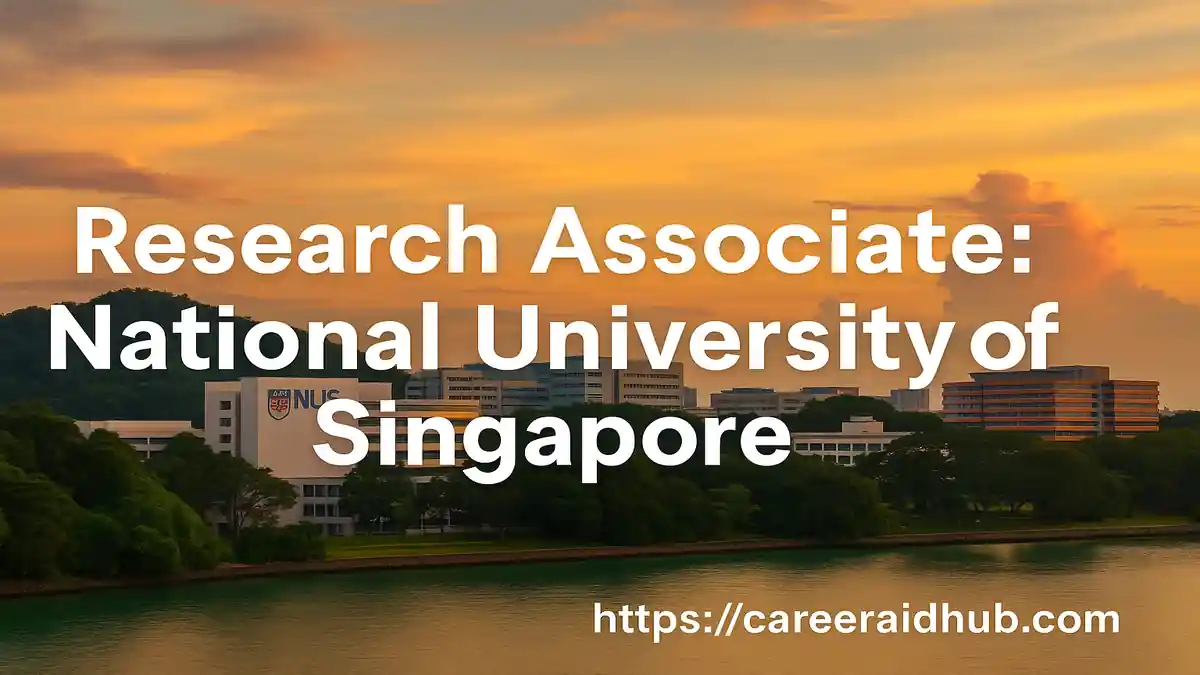Mahidol University International Postdoctoral Fellowship 2026: A Fully Funded Research Pathway in Thailand
Mahidol University, one of Thailand’s most prestigious public research institutions, has opened applications for the International Postdoctoral Fellowship, Fiscal Year 2026. The programme is designed exclusively for non-Thai, early-career researchers who already demonstrate strong scholarly potential and who wish to expand their work in a highly supportive, research-intensive environment. According to Mahidol University’s official information, the fellowship aims to attract global talent while strengthening the university’s position as a regional hub for advanced research and innovation.
If you are aiming to consolidate your research profile, collaborate closely with distinguished mentors and develop a sustainable academic trajectory in Asia, the Mahidol University International Postdoctoral Fellowship deserves careful attention.
This fully funded postdoctoral fellowship at Mahidol University supports outstanding international researchers with generous stipends, strong mentoring, and clear publication goals, enabling them to deepen expertise, build global collaborations, and accelerate their path toward independent academic careers in Thailand and the wider Asia–Pacific research ecosystem for emerging leaders in science.
Why Choose Mahidol University for Your Postdoc?
Mahidol University has a long history as a premier centre for medical, life science and technology-driven research. Over the decades, it has grown from a medical school
A Research-Intensive Ecosystem
For postdoctoral researchers, this wider context is crucial. You are not joining an isolated laboratory; you are entering an extensive ecosystem that provides:
Access to specialised laboratories, core facilities and research institutes
A culture of international collaboration with universities and research centres worldwide
A large network of medical, science and engineering faculties working together on interdisciplinary problems
Because of this environment, fellows can pursue projects that require advanced equipment, large datasets or clinical interfaces that might be difficult to access elsewhere. The combination of strong institutional infrastructure and international partnerships creates fertile ground for high-quality publications, competitive grant proposals and impactful real-world applications.
Rather than functioning as a simple mobility grant, this fellowship offers a structured and performance-oriented platform. Selected fellows receive generous financial support, rigorous academic supervision and a clearly defined expectation to produce high-impact publications in leading international journals. Consequently, the scheme is particularly suitable
Fellowship Objectives and Focus
The International Postdoctoral Fellowship 2026 has an explicit and ambitious mandate. Its primary goal is to support international postdocs who can help Mahidol University generate at least six high-quality research articles during the fellowship period. These outputs must be published in journals ranked within the top 10–20% (Q1) by SCImago Journal Rank (SJR) and indexed in Scopus or Web of Science.
A Performance-Driven Programme
In practical terms, this means the fellowship is best suited for researchers who already publish in reputable journals and who are ready to increase both the quantity and quality of their output. It is not a general visiting fellowship for academic tourism. Instead, it is a performance-oriented programme with clear expectations and structured monitoring.
Beyond individual achievements, the fellowship also seeks to:
Strengthen Mahidol’s international research profile by attracting global scholars
Enhance academic recognition for both mentor and fellow through joint publications
Improve the university’s publication metrics and overall research competitiveness
Thus, the
Research Fields Covered
The fellowship is open to projects in Life Sciences and Medicine as well as Science and Technology. Within these broad domains, the official announcement highlights a detailed range of eligible areas.
Life Sciences & Medicine
Medicine
Biological Sciences
Biology and Biochemistry
Clinical Medicine
Infectious Diseases
Microbiology
Immunology
Pharmacology and Toxicology
Public, Environmental and Occupational Health
Biotechnology and Applied Microbiology
Pharmacy and Pharmacology
Molecular Biology and Genetics
These fields reflect Mahidol’s long-standing strengths in health sciences and its strong connections to hospitals, public health agencies and biomedical research institutes. Fellows in these areas can often access clinical data, patient cohorts and experimental facilities that support translational and policy-relevant research.
Science & Technology
Engineering
Artificial Intelligence (AI)
Computer Science
In the technology domain, Mahidol is investing increasingly in data-driven science, AI applications, biomedical engineering and computational methods. Interdisciplinary projects that bridge
Funding and Financial Support
The Mahidol University International Postdoctoral Fellowship is fully funded and provides a comprehensive support package that covers living expenses, travel and essential administrative costs.
Monthly Allowance and Living Costs
Monthly allowance: 60,000 THB per month
This allowance is intended to cover accommodation, local transport, food and other day-to-day costs. When managed carefully, it enables fellows to concentrate on research without needing additional employment or external income.
Travel and Insurance Support
Round-trip economy airfare: Inbound and outbound international flights for the fellow
Travel insurance: Coverage up to a specified maximum for the duration of travel and initial stay
These benefits significantly reduce the financial burden of relocating to Thailand, especially for researchers coming from distant regions.
Health, Visa and Work Permit
Health insurance: Up to 10,000 THB per year
Visa and work permit support:
Visa extension fees
Work permit issuance and extension fees within defined ceilings
All funds are channelled through the host unit at Mahidol University, which also handles tax obligations and administrative processing. This arrangement reduces bureaucratic obstacles and ensures compliance with Thai regulations, allowing fellows to maintain a clear focus on academic work.
Duration and Output Expectations
The fellowship is structured initially as a one-year contract, with the possibility of annual renewal for up to three years in total, depending on performance and project progress.
Contract Length and Review
During each year, the fellow holds a full-time research appointment at Mahidol University. The continuation of the fellowship is not automatic; it hinges on meeting agreed milestones and demonstrating strong research performance. Progress reviews take place regularly, which helps both the fellow and the mentor adjust plans, priorities and timelines.
Publication Targets
Key expectations include:
Continuous, full-time presence and research engagement at Mahidol University
Submission of progress reports every six months outlining activities, outputs and future plans
At least six articles published or accepted in Q1 journals (top 10–20% by SJR) in Life Sciences & Medicine or Science & Technology over the fellowship period
Typically, two Q1 papers per year, where the fellow is first author or second author to the mentor
These targets are demanding, yet they are achievable with a well-designed project and effective collaboration. Because performance is closely monitored, fellows should propose research plans that balance ambition with feasibility and include a clear strategy for manuscript development from the outset.
Failure to meet agreed milestones can lead to non-renewal or early termination of the fellowship. Therefore, prospective applicants should carefully assess their capacity to deliver and discuss expectations frankly with potential mentors.
Who Can Be a Mentor?
The fellowship follows a mentor-driven model. In practice, Mahidol faculty members secure or hold funded research projects and then nominate suitable international postdoctoral candidates to join their teams.
Mentor Eligibility Requirements
To qualify as a mentor or supervisor, the Mahidol academic must:
Hold a lecturer or researcher position at Mahidol University
Possess a strong research track record with at least three publications as corresponding author in top international journals indexed in Scopus or Web of Science, ranked in Q1 by SJR in relevant fields, within the last five years
Ideally have an H5 index of six or more; those slightly below this threshold may still be considered if their overall record is compelling
Lead a funded research project—either internal or external—that can support at least three years of postdoctoral employment
Finding and Approaching a Mentor
For potential applicants, a crucial early step is to identify a suitable Mahidol mentor whose research interests align closely with their own. This typically involves:
Reviewing departmental websites and recent publications from Mahidol researchers
Identifying laboratories with active projects in your target field
Sending a concise, well-structured email summarising your background, publications and possible project ideas
By initiating contact early and discussing expectations openly, you can jointly determine whether the mentor meets the eligibility criteria and whether a nomination under this scheme is feasible.
Eligibility Criteria for International Postdoctoral Researchers
The fellowship sets clear eligibility conditions for applicants, reflecting its focus on early-career researchers with proven potential.
Core Eligibility Conditions
Applicants for the postdoctoral position must meet the following requirements:
Nationality: Must be non-Thai
Academic background: Completed a doctoral degree (PhD or equivalent) within the last five years from a recognised university
Age: Not older than 45 years at the application deadline
Publications: At least three papers in international journals indexed in Scopus or Web of Science within the last five years, typically as first author or as second author to the mentor
Status: Not currently holding another international postdoctoral fellowship or full-time employment elsewhere
Health: In good health with no contagious diseases
Profile of a Competitive Applicant
Because these conditions are relatively stringent, the programme effectively targets researchers who already have a solid, peer-reviewed publication record and a clear vision for their next stage of development. Competitive applicants will usually:
Show a coherent research trajectory and strong methodological skills
Demonstrate prior international collaboration or conference participation
Present a well-thought-out plan that fits naturally into the mentor’s ongoing projects
Application Process and Timeline
Applications are submitted primarily by the host unit or mentor, rather than directly by the postdoctoral candidate. This structure ensures that nominees are closely integrated into existing research projects from the outset.
Application Package
A typical application package includes:
Nomination letter from the head of the host faculty or institute
Completed application form (Form IR-PD1) signed by both mentor and candidate
Candidate’s detailed CV and full publication list
Copy of the funded research project and official award letter
Copy of the candidate’s passport and any other supporting documents requested in the call
As a candidate, you should work closely with your prospective mentor to provide accurate, up-to-date information and to ensure that all documents follow the specified format.
Fellowship Rounds and Tentative Schedule
For the 2026 fiscal year, Mahidol University has announced four application rounds, spaced across the year (October–December, January–March, April–June and July–September), with selection decisions released shortly after each round. The exact calendar may vary slightly, so you should always confirm the current timetable on the official website.
Looking ahead, and based on this pattern, the next cycle is likely to be announced around October of the following year. The precise month and year for subsequent rounds will depend on institutional planning; therefore, we will update soon once Mahidol publishes the official schedule.
How to Strengthen Your Application
Competition for the Mahidol University International Postdoctoral Fellowship is expected to be intense. Consequently, thoughtful preparation can significantly improve your chances of success.
1. Align with Mahidol’s Research Strengths
Start by focusing on topics where Mahidol already has strong laboratories, data resources or clinical partnerships. Fields such as infectious diseases, microbiology, public health, biomedical engineering and AI for health are particularly prominent. Alignment with institutional priorities signals that your work can integrate quickly and produce tangible outcomes.
2. Co-Develop a Realistic Publication Plan
Work closely with your potential mentor to design a three-year publication plan. This plan should:
Identify target Q1 journals and justify their relevance
Map out projected manuscripts and anticipated timelines
Consider contingency strategies if data collection or experiments are delayed
By presenting a detailed yet flexible roadmap, you demonstrate that the fellowship’s publication expectations are achievable and that you understand the demands of high-impact research.
3. Highlight Prior Collaboration and Networks
If you have co-authored papers, delivered joint conference presentations or contributed to projects with Mahidol researchers—or with institutions in the region—make sure these links feature prominently in your CV and cover letter. Prior collaboration reduces uncertainty, as it shows that you can work effectively in similar environments and that communication channels already exist.
4. Demonstrate Long-Term Commitment
Selection panels often look for candidates who view the fellowship as part of a longer career strategy, not merely a temporary stay abroad. Explain clearly how this postdoc will support your trajectory, whether toward a faculty position, the establishment of an independent research group or a future role in industry, public health or policy.
5. Prepare Strong Letters and Documentation
Finally, ensure that all forms, letters and supporting documents are complete, consistent and professionally presented. You should proofread every section carefully, avoid discrepancies between the application form and your CV, and provide clear evidence for each claimed achievement.
For additional context on postdoctoral funding and application strategies, you may also consult guidance from other research-intensive universities and funding agencies, which can help you benchmark your profile and refine your proposal.
Final Thoughts
The Mahidol University International Postdoctoral Fellowship 2026 offers an exceptional opportunity for non-Thai early-career researchers who seek a fully funded, publication-driven postdoc in a highly regarded Southeast Asian university. With robust financial support, clearly articulated expectations and access to experienced mentors, the programme provides a structured pathway to building a high-impact research portfolio across life sciences, medicine, engineering and computing.
If you meet the eligibility criteria, are comfortable working under performance-based conditions and are ready to commit to an intensive research agenda, you should study the official call carefully and begin conversations with potential mentors as early as possible. By aligning your project with Mahidol’s strengths, preparing a realistic publication plan and submitting a well-documented application, you can significantly enhance your prospects of being selected. For definitive information on requirements, forms and timelines, always rely on the latest details published by Mahidol University’s International Relations Division.
Summary Table
| Feature | Details |
|---|---|
| Program | Mahidol University International Postdoctoral Fellowship (Fiscal Year 2026) |
| Host | Thailand |
| Funded By | Mahidol University – Global Partnerships / International Relations Division, Office of the President |
| Duration | Up to 3 years (initial 1-year full-time contract, renewable annually based on performance) |
| Study Mode | Full-time, on-campus research at Mahidol University with dedicated supervision and lab affiliation |
| Eligibility | Non-Thai PhD holders (degree completed within the last 5 years), under 45 at deadline, minimum three Scopus/Web of Science papers, in good health, not holding another full-time postdoctoral fellowship or job |
| Financial | 60,000 THB monthly allowance; round-trip economy airfare; travel insurance; health insurance up to 10,000 THB per year; support for visa and work permit fees within programme limits |
| Fields | Life Sciences & Medicine (e.g., medicine, biological sciences, microbiology, public health, pharmacology, molecular biology) and Science & Technology (engineering, artificial intelligence, computer science) |
| Deadline | Four rounds per fiscal year (typically Oct–Dec, Jan–Mar, Apr–Jun, Jul–Sep); exact opening and closing months for the next cycle will be updated soon on the official website |
| Official | Mahidol Postdoctoral |
Frequently Asked Questions
The Mahidol University International Postdoctoral Fellowship supports non-Thai early-career researchers with fully funded, full-time postdoctoral positions focused on high-impact publications in life sciences, medicine, engineering and technology.
Eligible applicants are non-Thai researchers with a recent PhD, strong publication record in Scopus/Web of Science journals, good health and no concurrent full-time fellowship or employment elsewhere.
The fellowship covers life sciences, medicine, public health, biomedical sciences, molecular biology, engineering, artificial intelligence and computer science, plus interdisciplinary projects that combine health and technology.
The fellowship starts with a one-year full-time contract and, if performance remains strong, Mahidol University may renew it annually for up to three years in total.
Fellows receive a monthly stipend, round-trip airfare, health insurance support and assistance with visa and work permit fees, allowing them to focus fully on research activities.
Fellows are generally expected to produce around six Q1 journal articles over the fellowship, usually averaging two high-quality papers per year with the mentor’s guidance.
You should review Mahidol faculty profiles, identify researchers in your field, then email potential mentors with your CV, publications and a concise, well-structured postdoctoral project idea.
Mahidol usually runs several rounds across the fiscal year; therefore, you should check the latest call and plan early, as exact months and submission windows may change.










